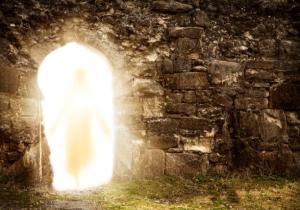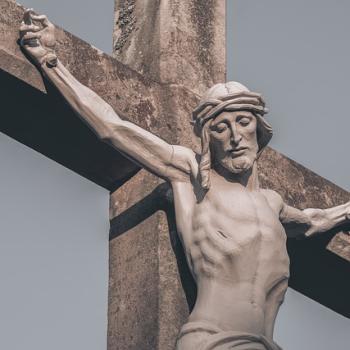
The apostles’ experiences of the Resurrection were confusing. Were they true? I think there’s good evidence to believe that because the apostles themselves seem to have gotten truer as a result. Admittedly, that’s an odd kind of evidence.
Typically one argues for the Christian belief in Jesus’ Resurrection by saying, “Look how much braver the apostles got after seeing Jesus risen from the dead.” It is true. They acted like a bunch of cowards up to Jesus’ death and willingly risked death and even crucifixion afterward. That change is a kind of evidence, but less convincing than one would like. People have died bravely for causes that were nonsense and even evil. And who knows what was going on in Jesus’ followers’ minds after he was taken away from them. It could have been hallucinations or mass hysteria.
What if we could see the apostles getting not only braver but also truer? That would be a change on a new level, a different order of magnitude. Say you’ve had your mind settled in a certain direction, going confidently down some path, well-worn or not. And somehow you realize that it just isn’t working. You know you have to change, but how hard that is!
The apostles had to make some hard changes like that. Hard work or maybe inspiration, or both. And if the changes were toward being truer, then the inspiration, wherever it came from, must have been true. That’s the argument here in a nutshell.
A confusing Resurrectiion story
In the Bible we don’t see the Resurrection. We see Jesus alive after having been crucified in a bewildering series of stories. Questions abound. For example:
- Did two women hear a message from an angel in Jesus’ empty tomb and announce the news to the disciples? (Matthew)
- Or was it a young man in a white robe with a message to three women, who fled in fear and didn’t say anything to anybody? (Mark)
- Or did three women (but not all the same women) hear a message from two angels and carry the news to the disciples. (Luke)
- Did Jesus promise to meet the disciples in Galilee (Matthew and Mark) but appear to them in Jerusalem anyway. (Luke and John)
- Did the women not enter the tomb at all but only Peter and the “other disciple”? (John
- Did Peter see Jesus first (Paul) or Mary Magdalene (John)?
John also has Jesus appearing to all the apostles except Judas and Thomas the Sunday evening of the Resurrection. And again a week later with doubting Thomas present.
Confusion is typical when you have more than one story, especially if none of the stories were written down until years after the event. But by the end of that first week, if not before, all the apostles must have believed that Jesus rose from the dead, right? But even after several more appearances, including to 500 people at once according to Paul, some are still not sure. Matthew ends his Resurrection with the eleven on a mountain.
When they saw him, they worshiped him, but some doubted (Matthew 28:17)
Why did some doubt? Luke in Acts says,
After his suffering he presented himself alive to them by many convincing proofs. (Acts 1:3)
Wouldn’t one convincing proof have been enough?
It took a while for Resurrection to sink in.
Probably, my argument goes, it took a while for the apostles to really believe what they were seeing. The Gospels give us 40 days of Resurrection experiences before Jesus ascends into heaven. Ten days later a large group of disciples has another strange experience with a strong wind and tongues of flame. That’s 50 days in all, but we have the Gospel stories from 40 or more years after that. That’s a more generous timeline for belief to settle in.
It was less than 40 years. The apostle Paul also wrote about death and resurrection, and he wrote his letters some 20 years after Jesus rose.
Paul is the murderous persecutor of Christians. He also appears to be something of a mystic. He had a strange experience of the risen Jesus as he was on the way to another rendezvous with those troubling Jesus people. One thing we can say for sure is that Paul had a conversion experience.
When we think of the apostles’ conversion, we’re usually thinking of turning from cowardice to bravery. Paul’s sin was anything but cowardice, and his conversion wasn’t anything like getting braver. I’m thinking the apostles’ sin was more than cowardice, and their conversion was more thorough than getting braver. It was like Paul’s, a redemptive change in the direction of one’s whole life. Paul underwent a total re-envisioning of what life was about and what God required of him. The apostles’ experience may have been a conversion and redemption like that. For both it couldn’t happen without some contact with truth.
Apostles, sinners like Paul
The apostles don’t seem like Paul, sinners in some monumental way. But Jesus knew better. He said on several occasions, “Repent, change your way of thinking, for the Kingdom of God is at hand.” But the apostles hadn’t made that mental conversion. They didn’t get the inclusive vision Jesus put into words and deeds. Jesus’ favorite parts of the Older Testament, the ones that opt for the poor and criticize God’s people’s tendencies toward exclusion were lost on them. They were rivals with each other in their pursuit of honor and looking for Israel’s triumph.
Jesus’ horrible death, his defeat at the end, took that bit out of them. They could no longer think of triumph in the world. Jesus died the shameful death of the most despised criminals. They could no longer think of honor and status. Cowardice and shame completed the collapse of their previous sense of their place in that world where honor and status were so important. They needed a new vision. That would be a difficult, long process.
Remembering more than cowardice
After the tragedy of Jesus’ death, the apostles couldn’t have come up with a new vision by themselves, at least not a true one. There were paths available for them to follow. They might have become cynics like some trendy philosophers. They might have joined the Zealot rebels. Or withdrawn like the ones who left the Dead Sea Scrolls in the desert. Instead they came to believe “by many convincing proofs” that God approved of Jesus. What was shameful in the eyes of the world was honorable in God’s eyes. It took a while to come to that.
Let’s imagine the apostles, men and women, getting together, days and weeks after the Crucifixion. They have amazing stories to share. They tell of seeing Jesus again, of hearing forgiving words from his lips: “Peace be to you.” They settle down to a meal together and continue telling stories. Some of the stories are about meals with Jesus, but not only Jesus. Many others were there – rich but unpopular Pharisees, hated tax collectors, merely despised poor, so-called sinners.
Now the stories get more personal. They remember incidents like:
- When they argued about which of them would be greatest in Jesus’ Kingdom. And Jesus said, “If anyone wishes to be first, he shall be the last of all and the servant of all.” (Mark 9:33-35)
- When they wanted to stop someone from driving out demons in Jesus’ name because “he was not following us.” And Jesus said, ”Whoever is not against us is for us.” (Mark 9:38-40)
- When they tried to keep children away from Jesus. And Jesus explained, ”The Kingdom of God belongs to such as these.” (Mark10:13-16)
A world without status
I used to think that the last episode with the children showed the apostles’ misplaced but sincere concern for Jesus. Jesus must have been tired and hardly ready for a mob of boisterous kids. But this story in Mark’s Gospel doesn’t say anything like that. That wasn’t the apostles’ motive or excuse. Probably the apostles thought about children the way everybody in the first-century Mediterranean world did. Children were lowest in the hierarchy of status. In the apostles’ minds children were unworthy of being with the great master. But Jesus was for children in the same way he was for tax collectors and “sinners” and the rest of those whom society marginalizes.
The apostles came to realize, finally, that they regularly took sides with the forces that killed Jesus, the forces that exclude certain others and cling to a sense of holy righteousness. Imagine what that must have felt like. And imagine what it must have meant to know they were forgiven by Jesus himself. “Peace be to you.” Imagine a feeling of energy and confidence, enough finally to adopt for their own Jesus’ world of equal honor for all, or no honor at all except God’s.
Evidence for the resurrection
The feeling the apostles had from their remembered experiences of the risen Jesus was not evidence of any reality or truth. No more does the feeling of unity and confident energy that followers of a Hitler or a David Jones mean they’re on the right track. But we can look at what the apostles attempted and partly accomplished in their new-found enthusiasm for Jesus. I’d call that a part of Jesus’ great step forward for humanity.
Only truth changes people for good. The apostles did change. That they got braver is certain, but a hallucination could have accomplished that without changing anything else. Somehow, after Jesus died, the apostles’ false hopes changed to true ones – a vision Jesus called the Kingdom of God. It was an aspiration in a direction that even today seems as good as any that our very different and, in some ways, more advanced world offers. The apostles got braver, but, more important, they got truer.
Conclusion and a bracing afterthought
Something amazing happened among Jesus’ followers after his death by crucifixion. That’s pretty certain. The many stories of Jesus’ resurrection appearances leave us in a state of confusion and even doubt, by themselves. But we know something about the change, the grace, that was working in these witnesses’ vision and subsequent lives. That gives us good reason to bank on the truthfulness of their experiences of Jesus risen from the dead.
Jesus must have known that his followers would need more than one “convincing proof.” How many does our world need, and where can it find these “proofs”? Only in the odd evidence of the lives of Christians, the difference that Christians make, the grace we Christians bring (or fail to bring) to the world.
















